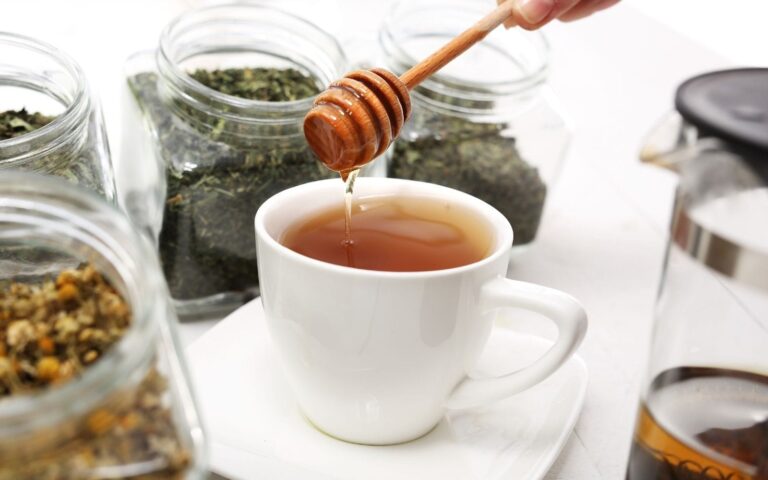What Tea Is Good For Acid Reflux? (8 Best Teas To Try)

Disclosure: This post may contain affiliate links. If you click on a link we may make a small commission at no extra cost to you. You can read the full disclosure here
What Tea Is Good For Acid Reflux?
Acid reflux and heartburn can make life very uncomfortable. Mealtimes can become a minefield of what you should or shouldn’t consume as you desperately try to avoid the often distressing symptoms that unfortunately accompany any poor choices. Therefore it follows that the more informed you are the better chance you have of avoiding costly mistakes.
What you choose to incorporate or avoid in your daily diet can make all the difference. Certain beverages can exacerbate symptoms others can aid the digestive process, thereby easing many stomach problems. Here we will look at what tea is good for acid reflux, and how it is purported to help this often painful condition.
Can Tea Make Acid Reflux Worse?
Any caffeinated beverages can aggravate acid reflux symptoms, so be sure to always opt for a decaffeinated brew. Many herbal infusions can help with digestive issues however, some can be mildly acidic as can true teas which may irritate the condition.
Treating acid reflux involves monitoring what you consume on a regular basis to identify any new triggers thereby avoiding any unnecessary discomfort.
Many people drink herbal infusions on a daily basis not only as a refreshing beverage but also for their health-giving properties. These benefits can vary largely depending on the type of tea you choose. Most herbal brews are caffeine-free and packed with antioxidants. So just what tea is good for acid reflux and heartburn?
Teas To Try For Relieving Acid Reflux and Heartburn

Herbal tea can provide a variety of digestive benefits and is generally considered a safe option for most people. However, you should always be cautious when adding a new tea variety to your daily routine. If you have any concerns then be sure to consult your health care provider, especially if you are taking any medications, are pregnant, or have any existing health conditions.
1. Chamomile Tea
The dried flowers of chamomile contribute to the medicinal properties of this ancient healing herb. Its preparations are used for many ailments such as insomnia, inflammation, rheumatic pain, and digestive disorders. Valued as a digestive relaxant, chamomile is said to treat stomach issues such as indigestion, flatulence diarrhea, nausea, and vomiting. It is thought to soothe the stomach, reduce gastric activity and aid the whole digestive process.
Your day-to-day choices influence your health greatly, as do the challenges of ordinary daily living. Chamomile tea can be a soothing remedy particularly for stress-related digestive issues such as acid reflux. It is the perfect herb for managing your stress response, so you may not experience the digestive symptoms to begin with. Drinking this potent brew before or after meals can even help the body to absorb more vital nutrients from food.
Chamomile tea can bring calmness and tranquility while its healing properties relieve the pain and swelling of the esophagus, soothe the stomach and help to promote good gut health.
TASTE: A delicate floral flavor with notes of crisp apple.
2. Licorice Root Tea
Licorice root tea is a natural remedy that has long been used as a medicinal herb for its anti-inflammatory and protective properties. Providing relief from ailments such as chronic coughs, sore throats, gum disease, and digestive problems.
Studies have found several potential health benefits to drinking licorice root tea which are attributed to its valuable antiviral and antibacterial activity. It appears to be a powerful stomach aid that offers soothing properties helping to calm irritation throughout the whole digestive tract. It may even reduce the symptoms of acid reflux and heartburn by increasing the mucus layer of the esophageal lining helping to protect it against stomach acid.
Licorice root tea is considered by many to be a herbal panacea for both physical and emotional issues. As well as bringing relief to abdominal discomfort it may also act as a mild tonic reducing stress and increasing energy helping to restore vitality, mood, and balance.
TASTE: A smooth, sweet-tasting tea with notes of anise and peppermint.
3. Ginger Tea
Ginger has been used for many years for medicinal purposes as it is packed with anti-inflammatory and antioxidant properties which have beneficial effects on the gastrointestinal tract. Made from the pungent ginger root, it creates a wonderful spicy brew that aids with digestion and relieves nausea.
Recently it has been identified in studies that ginger may be an effective treatment for acid reflux. It contains a compound called gingerol, which helps with stomach inflammation, reduces gastric contractions, and relieves gastrointestinal irritation. It also stimulates the production of bile to break down food possibly relieving the symptoms of heartburn.
For improved digestion, ginger tea can be consumed before or after a meal. It is both warming and soothing and maybe one of the best home remedies for helping to reduce digestive issues.
TASTE: A warming, slightly citrusy brew with a hint of spice.
4. Marshmallow Root Tea
Marshmallow root is a long-standing herbal folk remedy. Its medicinal properties come from the sap-like substance produced by the plant which is believed to contain antibacterial, anti-inflammatory, and antioxidant properties. It has commonly been used to treat respiratory, digestive, and skin ailments.
Marshmallow root tea is said to provide a soft soothing layer to coat your digestive tract helping to protect mucus membranes from acid irritation and possibly stimulating the cells that support tissue regeneration. However, only small-scale human studies have been conducted so more evidence is needed to support this claim. It is also said to have the potential to treat a range of other digestive issues such as constipation heartburn and colic.
TASTE: A deeply soothing, mild earthy root-like flavor.
5. Fennel Tea
Fennel tea has become increasingly popular in recent years. However, the health properties of this aromatic brew have been known for centuries. It is a rich source of vitamins and minerals which may provide antioxidant, anti-inflammatory, antibacterial, and antispasmodic effects.
Fennel has been used through the ages to aid digestion, relieve muscle spasms, bloating, constipation, and excessive flatulence. More recently fennel has been used to reduce the discomfort of painful periods as research suggests it keeps the uterus from contracting.
In addition to these more common uses, studies have shown that fennel tea is also an effective natural remedy for anxiety, depression, and insomnia. For some, it also appears to be a potential solution for calming heartburn and acid reflux.
In general, anything that is fatty, acidic, or highly caffeinated should be avoided as they are more likely to aggravate reflux. Fennel is an alkaline food that may help to offset strong stomach acid and possibly help to heal the irritated mucosal layer in the esophagus. However, we are all individuals so it is best to experiment to find out what works for you.
TASTE: A sweet, invigorating licorice-like flavor
6. Slippery Elm Tea
The inner bark of the slippery elm tree has been used by Native Americans for centuries. It is believed to help with stimulating mucus production in the intestines and aids in forming a protective coating in the gastrointestinal tract, providing relief from acid reflux.
Slippery elm contains calcium which may act as a mild antacid helping to ease painful symptoms in the short term – calcium acts by neutralizing stomach acid.
There is some evidence to support slippery elm tea helping with certain digestive issues but the research findings to date are mixed.
TASTE: A pleasant tasting infusion faintly sweet and earthy.
7. Turmeric Tea
Turmeric is an ancient spice related to ginger. Its use dates back thousands of years and many health experts today believe it has significant medical potential. It is a popular drink in Ayurvedic medicine and is commonly consumed for its cleansing properties. Turmeric tea is a warm soothing beverage and is an effective way to consume the potent spice.
Curcumin is the active ingredient in turmeric that boasts a host of health-giving properties. It is rich in antioxidants and anti-inflammatory immune-boosting compounds which are believed to aid in digestive function, help prevent esophageal inflammation and bring relief for heartburn.
Acid reflux may be caused by inflammation and oxidative stress therefore antioxidants and anti-inflammatories may be considered an effective treatment. Turmeric is recognized by many as an alternative therapy for stomach ulcers, inflammation, and heartburn however research is very limited and further studies are needed to determine its true effectiveness.
TASTE: Bitter/sweet and slightly peppery with earthy notes.
8. Lavender Tea
Lavender is a herb native to the Mediterranean region and Western Asia. It has been used for medicinal purposes since ancient times and is believed to have anti-inflammatory, antibacterial, antiseptic, and calming effects. Lavender tea is a delicate infusion made from the dried flowers of the lavender plant. This tea has many health benefits including calming anxiety and depression, improving digestion, reducing headaches, easing menstrual cramps, and relieving insomnia.
Lavender tea is also a popular herbal infusion used to alleviate the symptoms of acid reflux, including heartburn. With research showing that lavender can reduce inflammation, and relax the stomach, many people find that drinking this herbal tea helps them to manage their reflux issues. However, there is little clinical evidence to support this but with its anecdotally reported ability to soothe irritated stomach muscles and relieve indigestion, it may be worth giving lavender tea a try.
TASTE: Light floral flavor with a slightly earthy undertone.
Understanding Acid Reflux

Acid reflux, also known as gastroesophageal reflux disease (GERD), is a chronic condition characterized by the backflow of stomach acid and other digestive juices into the esophagus. It can cause coughing, chest pain, and hoarseness. It can also be associated with asthma and allergies. GERD occurs when the muscles at the top of the stomach relax and allow gastric contents to creep up into the esophagus.
GERD, unlike the average bout of heartburn every now and again, is defined as a chronic condition. The main symptoms of acid reflux are:
- Heartburn -A burning sensation in your chest area usually behind the breastbone
- A sour unpleasant taste in your mouth
- A cough or hiccups
- A hoarse voice
- Bloating and nausea
- Bad breath
- Difficulty swallowing
- Regurgitation of food or sour-tasting liquid
- The sensation of a lump in your throat.
Healthy Lifestyle Changes to Help Acid Reflux and Heartburn
Many people suffer from heartburn and it’s not always obvious why. The most common triggers include certain food and drink, being overweight, pregnancy, stress, hiatus hernia, and some medications. There are numerous self-help factors worth considering when it comes to treating acid reflux:
- Stop smoking
- Avoid tight-fitting clothing that restricts the abdominal area
- Eat smaller meals and eat slowly
- Don’t lie down straight after eating
- Sleep with the upper body elevated
- Consider trying to lose excess weight
- Limit any triggering foods – it may help to keep a food diary
- Avoid caffeine and carbonated beverages
- Seek medical help if our problems persist.
Conclusion
Herbal teas can be extremely effective when it comes to taming tummy troubles. Knowing what tea is good for acid reflux and which herbal infusions may help or aggravate your particular set of symptoms is essential.
Adding a warming herbal brew to your daily routine may not only offer short-term relief from heartburn but may also help to start building a healthier digestive system in the long term.
Most herbal teas are caffeine-free and depending on the herbal blend they feature a variety of vitamins, minerals, nutrients, and antioxidants. There are numerous types of herbal teas, all with their unique benefits helping to improve body functions and support your physical and mental well-being. That’s healthy living!
FAQs
Is Peppermint Tea Good For Acid Reflux?
Peppermint tea may actually make your acid reflux worse as it has the ability to relax the esophageal sphincter and increase stomach acid. However, it is still packed full of antioxidants to help promote long-term healing and is often the tea of choice for many other digestive issues.
What Foods And Drinks Make Acid Reflux Worse?
The specific triggers for heartburn and acid reflux can differ from person to person. However, common causes include Alcohol, Caffeine, Chocolate, Carbonated Drinks, High Fat Dairy, Citrus Fruits, Tomatoes, Garlic, Onions, Spicy Foods, Fried foods, Peppermint, Processed Foods.
Is Green Tea Good For Acid Reflux?
Green tea is a true tea from the Camellia sinensis plant and therefore it contains tannins and caffeine. It may only be a small amount but it could still be enough to trigger acid reflux symptoms in some people. Interestingly though, green tea has been linked to improving the digestive process by encouraging the growth of good gut bacteria, thus contributing to the improvement of overall gut health. Recent studies suggest that probiotics had some benefits for acid reflux.






